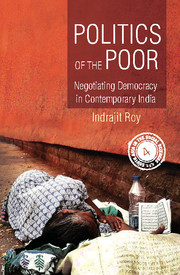Book contents
- Frontmatter
- Contents
- List of Tables, Map and Charts
- Acknowledgements
- Glossary
- Acronyms
- Introduction: Against False Binaries
- 1 The Perspectives of the Study: Towards an Agonistics of Democracy
- 2 Political Spaces: Institutional Opportunity Structures
- 3 Political Spaces: Social Relations of Power
- 4 From Clientelism to Citizenship?: The Politics of Supplications
- 5 From Moral Vocabularies to Languages of Stateness?: The Politics of Demands
- 6 From Backwardness to Improvement?: The Politics of Disputation
- 7 From Tradition to Modernity?: The Politics of Imagination
- Conclusion: The Politics of the Poor: Agonistic Negotiations with Democracy
- Annexure 1 The Dramatis Personae, 2009–10
- Annexure 2 The Census Survey
- Annexure 3 The Multidimensional Poverty Index
- Annexure 4 Schedule for BPL Census 2002
- Annexure 5 Schedule for BPL Census 2002 West Bengal
- Annexure 6 BPL Cutoff List for West Bengal
- Bibliography
- Index
7 - From Tradition to Modernity?: The Politics of Imagination
Published online by Cambridge University Press: 03 August 2019
- Frontmatter
- Contents
- List of Tables, Map and Charts
- Acknowledgements
- Glossary
- Acronyms
- Introduction: Against False Binaries
- 1 The Perspectives of the Study: Towards an Agonistics of Democracy
- 2 Political Spaces: Institutional Opportunity Structures
- 3 Political Spaces: Social Relations of Power
- 4 From Clientelism to Citizenship?: The Politics of Supplications
- 5 From Moral Vocabularies to Languages of Stateness?: The Politics of Demands
- 6 From Backwardness to Improvement?: The Politics of Disputation
- 7 From Tradition to Modernity?: The Politics of Imagination
- Conclusion: The Politics of the Poor: Agonistic Negotiations with Democracy
- Annexure 1 The Dramatis Personae, 2009–10
- Annexure 2 The Census Survey
- Annexure 3 The Multidimensional Poverty Index
- Annexure 4 Schedule for BPL Census 2002
- Annexure 5 Schedule for BPL Census 2002 West Bengal
- Annexure 6 BPL Cutoff List for West Bengal
- Bibliography
- Index
Summary
Love, dignity, respect: no one should be deprived of these things. We may not have these in our lifetime, but we hope that our children and grandchildren do in theirs.
Jamuni Rishi, 9 April 2010, 35, Landless labourerThe conjunctions between the opportunity structures inhered in India's unequal democracy and the social relations of power form political spaces. Such spaces shape poor people's negotiations with members of other classes. Their negotiations intimate the meanings they make of democracy. In the preceding chapter, I examined these negotiations in the context of a governmental intervention which is universal in its scope. The electrification program to which I directed attention is neither targeted to a specific section of Rahimpur's population nor is it conditional upon the performance of manual labour by potential beneficiaries. The chapter noted people's negotiations with the program in the context of an incorporative political place where the labouring classes collaborated uneasily with the entrenched classes against the precarious classes. In doing so, I offered a detailed account of the ways in which their disputations with the narratives of improvement reproduce extant social relations of power, but also strain these relationships. Whereas Rahimpur's people supplicate before their politicians in the context of a narrowly- targeted public policy and make demands in the context of broader-based public policy, they are able to push the limits of these relationships against the backdrop of universal public policy. Such negotiations illustrate the ways in which universalistic ideals entangle with particularistic practices in actually-existing democracies. In the present chapter, I continue my explorations of poor people's multifaceted negotiations with democracy in the context of another universally applicable policy. However, here I focus attention on a ‘populist’ political space. The discussions in this chapter draw on my fieldwork in Bihar's Sargana village, where the labouring poor collaborate with the precarious classes against the entrenched classes.
The policy context is provided by the Bihar State Government's legislation declaring the public character of the State's Hindu, Buddhist and Jain temples. The legislation draws on Wakf laws that administer Muslim places of worship and guarantee their public character. Since the promulgation of this law, the State's temples are mandated to not only have their accounts audited by government authorities but to also involve members of the public in their administrative and financial management.
- Type
- Chapter
- Information
- Politics of the PoorNegotiating Democracy in Contemporary India, pp. 346 - 395Publisher: Cambridge University PressPrint publication year: 2017

